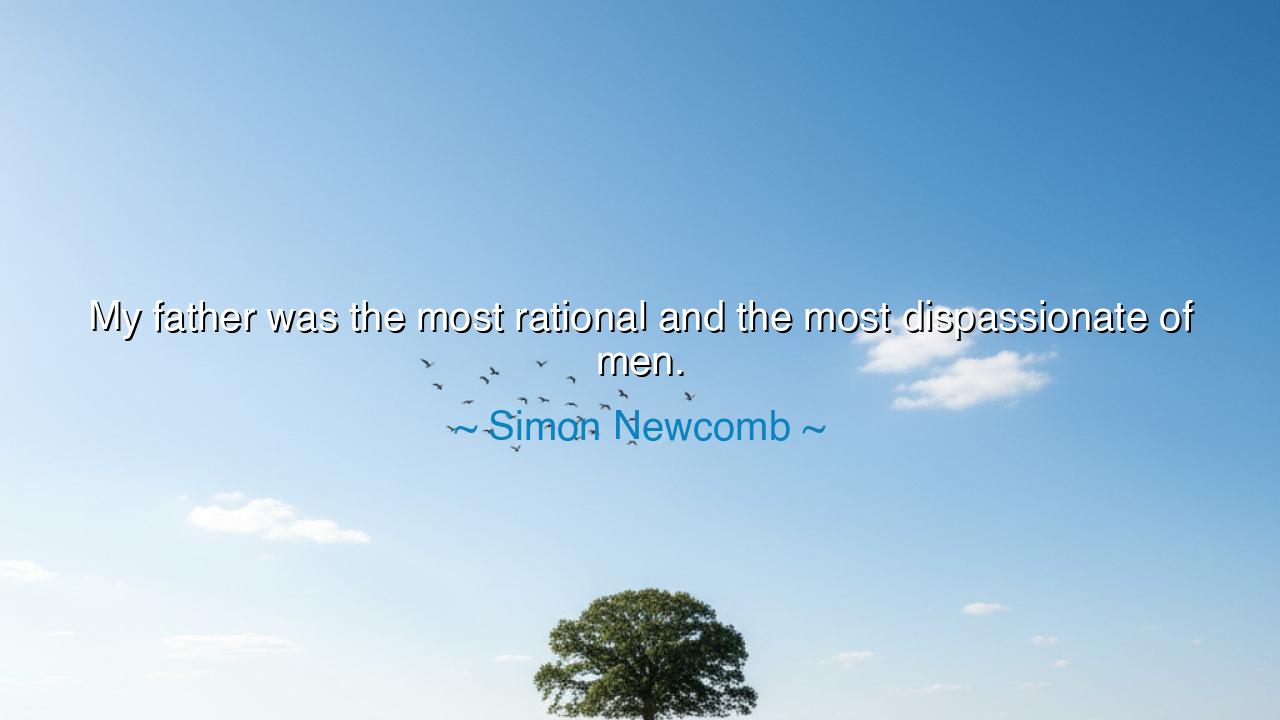
My father was the most rational and the most dispassionate of






The words of Simon Newcomb, “My father was the most rational and the most dispassionate of men,” are a tribute not merely to a man, but to a way of being—a quiet mastery of mind over emotion, of principle over impulse. In these words we hear both reverence and reflection: reverence for a father who stood like a steady flame in a storm, and reflection upon the rare virtue of rationality—that power to see clearly through the haze of passion. Newcomb, a man of science and reason himself, saw in his father the embodiment of clarity, of self-control, of that calm wisdom that has guided the great minds and leaders of every age. For while the world is moved by feeling, it is built by those who can think beyond it.
To be rational and dispassionate is not to be cold, but to be wise. The ancients taught that the highest form of strength was not in conquering others, but in conquering the self. The Stoics, those philosophers of marble resolve, believed that a man ruled by emotion is a slave, while he who governs his thoughts is free. Perhaps Newcomb’s father, like those noble thinkers, walked through life not untouched by feeling, but ungoverned by it. He knew that anger clouds truth, that fear poisons reason, and that desire blinds judgment. In this way, he became an anchor for his son—a living example that calmness is power, and that the truest heroism is the mastery of one’s inner storms.
Consider Marcus Aurelius, emperor and philosopher, who ruled Rome not with rage but with restraint. Amidst wars, betrayal, and the temptations of absolute power, he remained steadfast in thought and serene in action. His heart burned with duty, yet his mind stayed cool as the northern wind. When the world tested him, he turned not to vengeance, but to understanding. “You have power over your mind,” he wrote, “not outside events.” Like Newcomb’s father, Marcus Aurelius proved that rationality is not weakness, but the highest form of courage—the strength to face chaos without losing one’s center.
In the modern age, where passion is often mistaken for purpose and noise for conviction, the dispassionate man may seem out of place. Yet he is needed more than ever. The man who pauses before speaking, who weighs before deciding, who feels but is not ruled by feeling—he is the guardian of balance in a fevered world. He acts not in haste, but with understanding. He judges not from emotion, but from truth. To be dispassionate is to see the world as it is, not as fear or desire would paint it. It is to stand upon the mountain while others stumble in the valley of confusion.
But such composure is not born easily. It is forged through discipline, through patience, through the humbling art of reflection. The rational man learns to step back from his own heart, to observe his anger before it erupts, to question his joy before it blinds him. He studies himself as one might study the stars—with curiosity, not condemnation. And through that quiet observation, he becomes the master of his fate. This, perhaps, is what Newcomb learned from his father: that wisdom is not a fire that flares in moments of brilliance, but a steady light that burns through all seasons of life.
The story of Simon Newcomb himself confirms this inheritance. A self-taught astronomer who rose from poverty to become one of the great scientific minds of his age, Newcomb carried within him his father’s calm reasoning. While others speculated wildly about the heavens, he measured and calculated, unveiling truths with patience rather than pride. His discoveries—precise, methodical, unshaken by vanity—were the living continuation of the temperament he so admired. In honoring his father as “the most rational and dispassionate of men,” he was, in truth, acknowledging the source of his own greatness.
The lesson for us, children of a restless age, is this: learn to be still within. Do not let your heart be tossed by every wave of emotion or fashion of thought. Cultivate the cool clarity of reason—not to extinguish feeling, but to guide it. Speak with calm when others shout, act with purpose when others rush, and choose truth even when it is less thrilling than illusion. Remember always that passion burns bright and dies, but reason endures and builds.
So, dear listener, take Simon Newcomb’s remembrance as your own compass. Strive to be both wise and steady, to live by principle rather than impulse, to face each trial with the mind clear and the heart quiet. For the man who can think when others panic, who can act without anger, and love without losing judgment—he becomes, like Newcomb’s father, a pillar in the chaos of the world. And one day, may your own children say of you, with reverence and peace, “My father was the most rational and the most dispassionate of men.”






AAdministratorAdministrator
Welcome, honored guests. Please leave a comment, we will respond soon